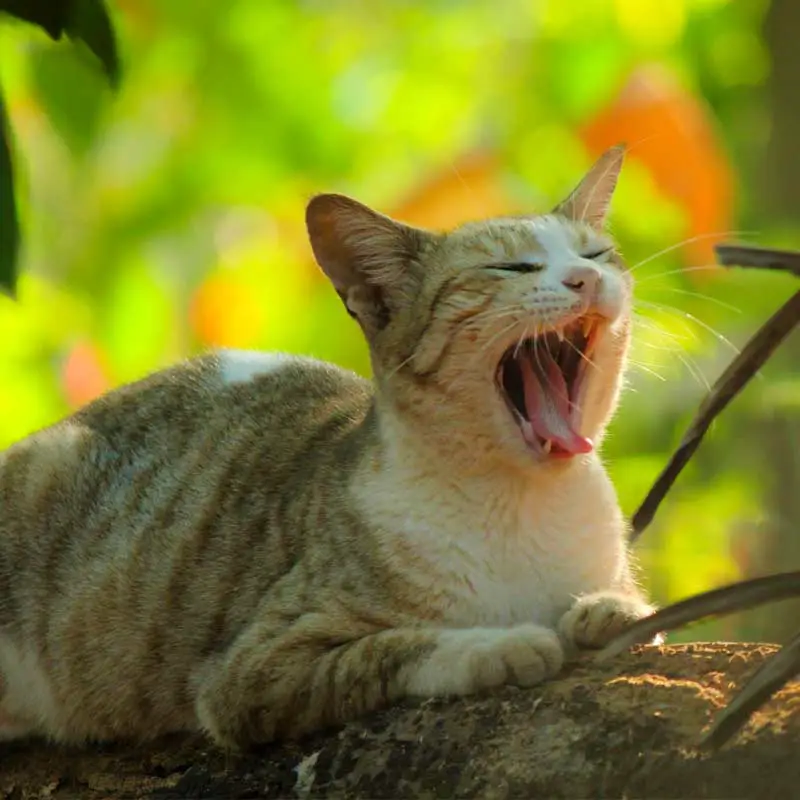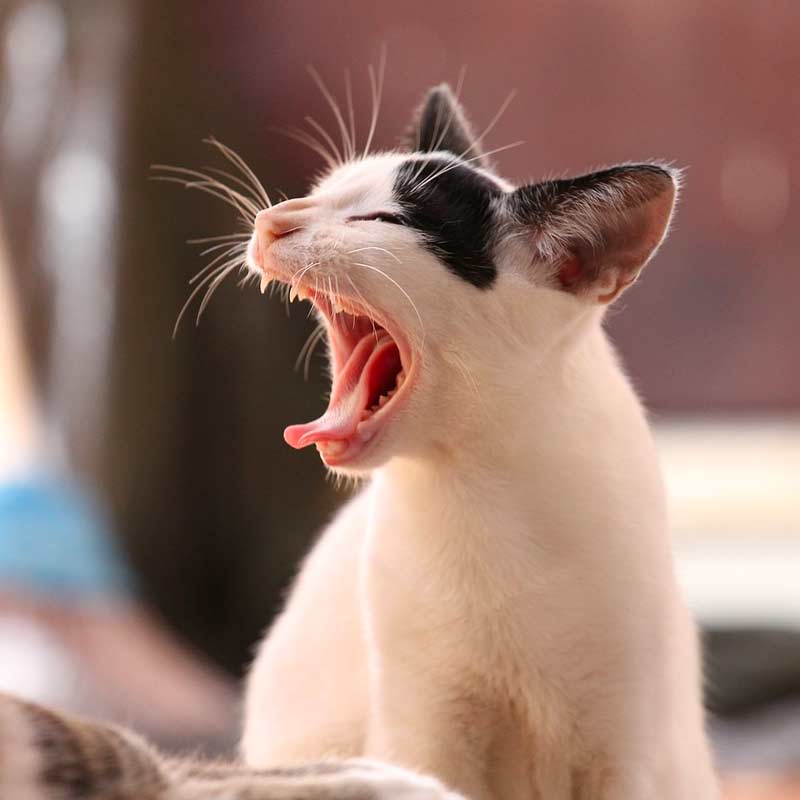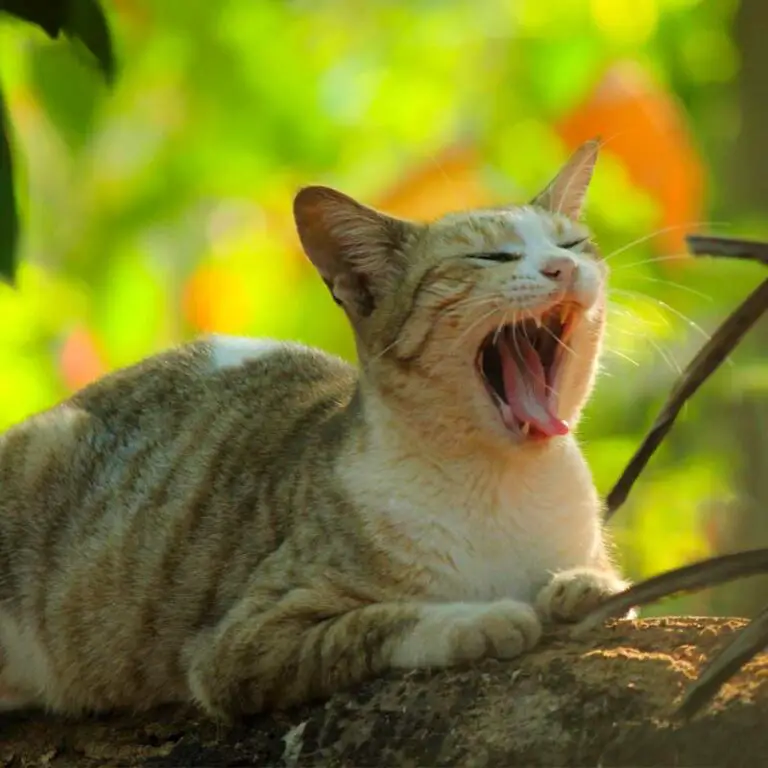All cat owners know that when their cats start licking their fur, they’re in for a mess. But do you know why cats lick themselves so much? Turns out, cats have poison in their saliva! While it’s not harmful to them, it can be pretty gross for us humans. Keep reading to find out, do cats have poison in their saliva?
Do cats have poison in their saliva?
Yes, cats have poison in their saliva, but this is poisonous only for birds and mice. Cats who especially live outdoors for long-duration have bacteria in their saliva and can be harmful to humans too.
The bacteria in cats’ mouths is actually pretty concerning, but it doesn’t always lead to serious symptoms. To be safe from “cat scratch disease,” which can infect humans without warning signs as many other illnesses do–always wash thoroughly after being bitten or scratched by any feline friend!

Do cats have poison in their teeth?
Yes, they have poison in their teeth. Cats have been known to be a carrier for tons of different types of bacteria, but it’s not just their mouths that are harmful. Their teeth can puncture the skin and inject themselves with germs when they bite you! This is an especially dangerous situation because if left untreated the infection could get worse before healing – trapping even more dirt- Highest bidder wins
Can you get sick from cat Spit?
Yes, there’s a chance of getting sick from cat spit. Many people think that the saliva in cats is always sterile. This is actually not true. Bacteria can develop easily in cats’ mouths and almost all cats have it. And if you get injured by their teeth or claws, you can get it too!
Cat saliva is not poisonous to humans, but if it is left in contact with your skin for a long time (an hour or more), the bacteria found in its saliva can cause skin infections.
There are also some other diseases that can be transmitted to humans by cats, such as Toxoplasmosis and Bartonellosis. Cats can pass these germs to humans through their urine, feces, or saliva.
Is cat saliva clean for humans?
No, cats saliva is not clean for humans as it has bacteria in it, but it’s not necessarily harmful to humans. A healthy cat has a lot of good bacteria in its mouth. These bacteria are not harmful to the cat, but they can be bad for humans if their saliva is left on your skin too long.
Is cat saliva antibacterial?
Yes, it’s antibacterial for cats’ wounds and injuries, but it’s not antibacterial for humans. The saliva of cats contains a lot of good bacteria and helps the cat to treat its wounds.
These good bacteria are not good for humans and can cause infections if they stay on your skin for several hours. If you want to protect yourself from infection, always wash your hands after petting or playing with cats.
Why does my cat’s saliva stink?
If your cat’s saliva smells bad, there’s a chance that this is caused by gum disease. Gum disease in cats usually starts because of plaque and tartar; when the teeth are not cleaned properly, bacteria start to grow and can be easily passed to the gums. When this happens, you need to immediately take your cat to the veterinarian to get proper treatment.

What diseases can a cat give a human?
Cats often pass saliva and other germs to their human caretakers without even realizing it, which makes them possible carriers of both common and rare diseases. The most common illness that your cat can give you is the “cat scratch disease.”
This disease is caused by bacteria called Bartonella henselae. This bacteria can be found in the saliva of cats, so if you get scratched or bitten by your cat, it’s possible that you will get ill too.
Cats are great pets and they’re considered to be low-maintenance for humans; however, this doesn’t mean that they do not have any potential health risks for humans.
You have to be very careful when playing or petting with your favorite feline friend because even if their saliva is not poisonous to humans, it can cause skin infections.
If you get in contact with the saliva of a cat and it stays on your skin for several hours, you can develop an infection at the place where you were injured by this cat’s teeth or claws.
Cats are not usually carriers of rabies, but they can transmit other dangerous diseases to humans such as:
- Rabies – can be transmitted to humans through saliva, brain tissue, spinal cord fluid, or other nervous system tissues.
- Toxoplasmosis – This is a parasitic infection that can cause flu-like symptoms in humans. It’s usually passed from cats to humans when the cat litter box is not properly cleaned after your kitty uses it.
- Bartonellosis – you can get this rare infection from a cat if it bites or scratches you.
What happens if my cat licks his incision?
Do not allow your cat to lick his incision as it can harm the stitches used to close the wound. The saliva of cats can be very dangerous for humans if the cat licks the wounds on his body, so it’s important to stop him from licking his incision.
If your cat starts licking his incision or chewing on its stitches, you need to distract him with something else and take him away from this place.
When you start noticing signs of infection, such as excessive swelling and redness, unbearable pain in the wound, a foul odor, or pus discharge from the stitches; it’s very important to immediately take your cat to the veterinarian.
What happens if a cat tastes human blood?
Generally, it doesn’t have any effect on cats if they taste human blood. However, if they taste the blood of another cat (or other animals), it may cause them to become more aggressive.
Final words
In this blog post we covered the topic: do cats have poison in their saliva and teeth? We’ve also discussed the fact that cat saliva has enzymes that help them digest prey animals, and while these enzymes aren’t harmful to humans in small quantities, as long as we keep our kitties healthy and free of parasites, their licking is nothing to worry about.
However, more care has to be taken in case of a cat bite, as cats have very sharp teeth, and bacteria deeply penetrate into the body if bitten by cats. Hope you found this information helpful, and remember to always wash your skin if a cat has licked you!
Related Articles:




